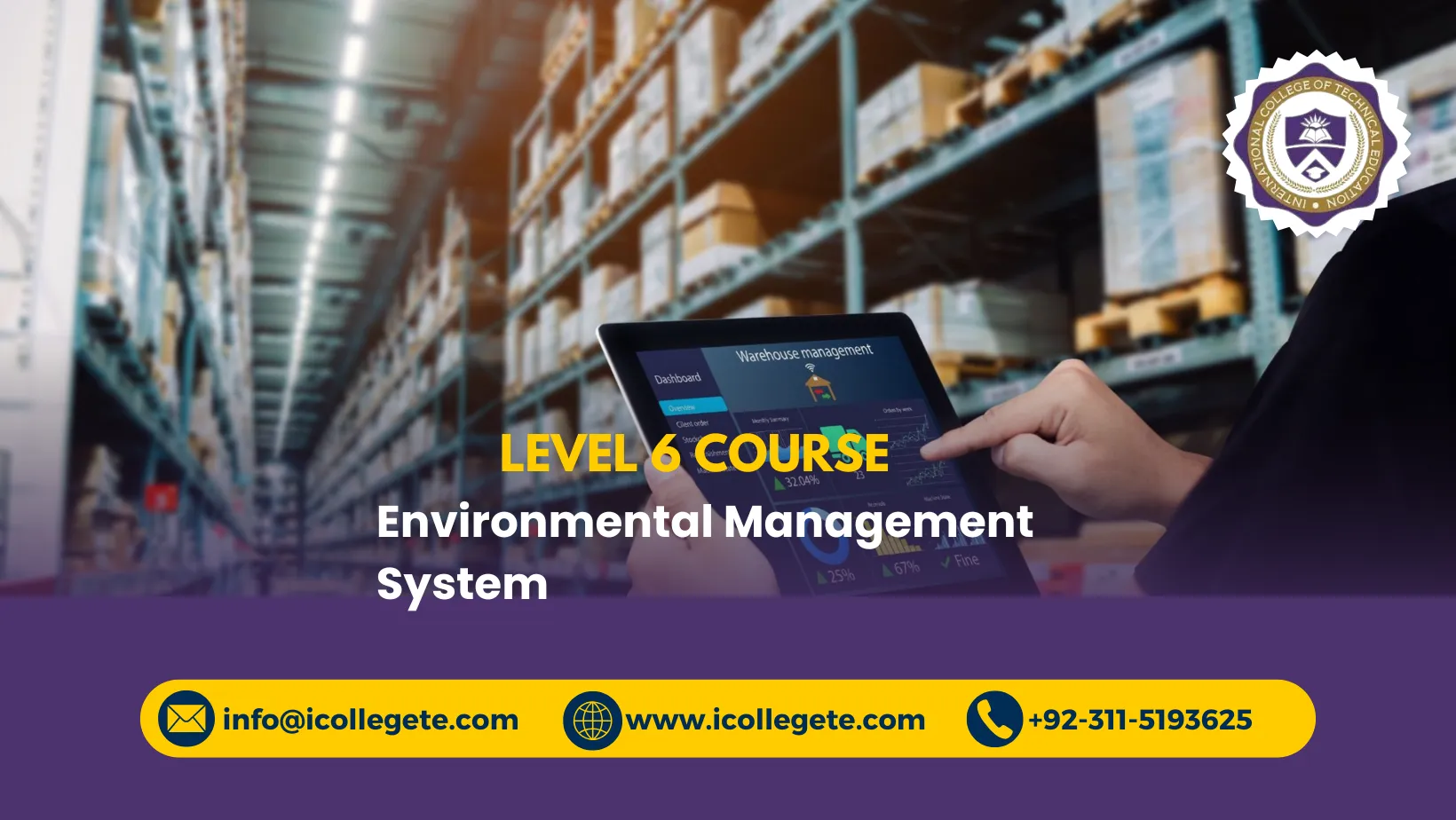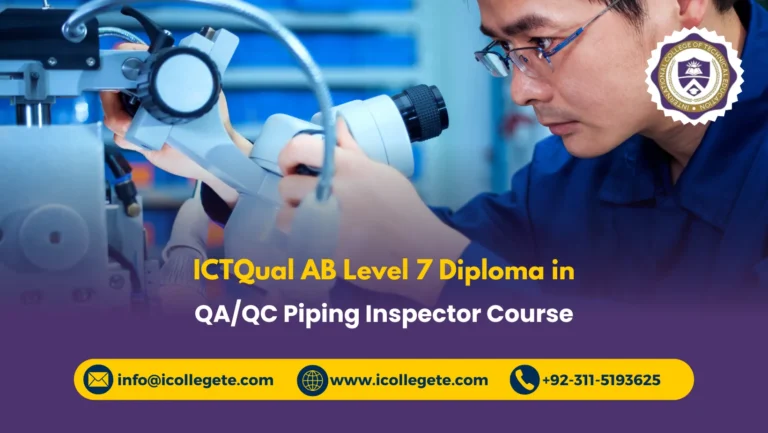Take the next step toward professional environmental responsibility with the Environmental Management System (EMS) Level 6 Course in Rawalpindi—a practical, career-focused qualification designed to equip learners with the core competencies required to implement, monitor, and maintain environmental management systems across various industries. Environmental Management System level 6 Course in Rawalpindi is ideal for individuals seeking to build foundational expertise in environmental compliance, sustainability practices, and ISO 14001 standards.
Structured to meet industry and regulatory expectations, the EMS Level 6 course introduces learners to essential concepts such as environmental impact assessment, legal obligations, operational controls, and performance evaluation. Participants will gain hands-on experience in identifying environmental risks, setting objectives, and supporting continuous improvement within organizational frameworks. The Environmental Management System level 6 Course in Rawalpindi also emphasizes documentation, internal auditing, and stakeholder communication—key elements for maintaining effective environmental systems.
Delivered in Rawalpindi, Environmental Management System level 6 Course in Rawalpindi is suited for professionals working in manufacturing, construction, energy, public services, and consultancy. Environmental Management System level 6 Course in Rawalpindi prepares learners for roles such as Environmental Technician, Compliance Assistant, or Sustainability Coordinator. No prior EMS certification is required, making it accessible to those entering the field or expanding their technical skillset.
By completing the EMS Level 6 Course, participants will be equipped to contribute meaningfully to environmental performance, regulatory compliance, and sustainable development goals within their organizations.
Course Overview
The Environmental Management System (EMS) Level 6 Course in Rawalpindi is a structured intermediate qualification designed to build practical expertise in environmental operations. Divided into six focused study units, the course introduces learners to essential EMS components including operational controls, documentation, performance evaluation, and stakeholder engagement. Each unit is crafted to support hands-on learning, allowing participants to understand how environmental systems function within real-world organizational settings. The Environmental Management System level 6 Course in Rawalpindi emphasizes applied knowledge, making Environmental Management System level 6 Course in Rawalpindi ideal for those who want to contribute to environmental performance without needing prior certification.
Environmental Management System level 6 Course in Rawalpindi is tailored for technicians, assistants, and junior staff working in manufacturing, construction, energy, and public service sectors. Environmental Management System level 6 Course in Rawalpindi offers a step-by-step learning experience that builds confidence in managing environmental responsibilities. Learners gain exposure to tools and techniques that support monitoring, internal reviews, and compliance tracking. The six-unit format ensures that each module reinforces the next, helping participants develop a well-rounded understanding of environmental management practices. The Environmental Management System level 6 Course in Rawalpindi also introduces learners to basic auditing principles and reporting methods aligned with ISO 14001 standards.
Delivered in Rawalpindi, the EMS Level 6 Course serves as a gateway to further specialization in environmental auditing, sustainability reporting, and system implementation. Environmental Management System level 6 Course in Rawalpindi prepares learners for support roles in environmental teams and provides a foundation for career progression in compliance and sustainability. With its practical orientation and accessible structure, the Environmental Management System level 6 Course in Rawalpindi empowers individuals to take active roles in improving environmental outcomes within their organizations. Environmental Management System level 6 Course in Rawalpindi is especially beneficial for those seeking to formalize their experience or transition into environmental management roles.
Course Study Units
- Environmental Impact Identification and Assessment
- Operational Controls and Resource Management
- Legal and Regulatory Compliance in EMS
- Environmental Documentation and Record-Keeping
- Internal Environmental Auditing Techniques
- Stakeholder Communication and EMS Awareness
Learning Outcomes for this course
Understand Core Environmental Management Principles
- Define the purpose and structure of an Environmental Management System (EMS)
- Recognize the role of EMS in supporting sustainability and regulatory compliance
- Identify key components of ISO 14001 and their practical applications
- Understand the relationship between environmental policy and operational controls
- Explain the importance of continual improvement in EMS frameworks
- Distinguish between environmental aspects and impacts within organizational activities
- Apply EMS principles to real-world scenarios across various industries
Apply Environmental Impact Assessment Techniques
- Identify environmental risks and assess their potential consequences
- Use basic tools to evaluate the severity and likelihood of environmental impacts
- Document findings in structured formats for internal review
- Support decision-making with evidence-based impact assessments
- Recommend mitigation strategies for common environmental risks
- Collaborate with teams to implement control measures
- Monitor effectiveness of impact reduction initiatives
Ensure Compliance with Environmental Regulations
- Interpret local and international environmental laws relevant to your sector
- Maintain records and documentation required for regulatory audits
- Develop procedures to meet legal obligations and permit conditions
- Support organizational readiness for inspections and compliance reviews
- Communicate legal requirements to operational teams
- Identify non-compliance risks and propose corrective actions
- Align EMS practices with evolving regulatory standards
Manage Operational Controls and Resource Use
- Implement procedures to manage waste, emissions, and resource consumption
- Monitor environmental performance indicators across departments
- Support energy efficiency and pollution prevention strategies
- Maintain operational records for EMS documentation
- Coordinate with teams to ensure adherence to environmental controls
- Evaluate the effectiveness of control measures
- Promote responsible resource use within organizational operations
Conduct Internal Environmental Audits
- Plan and prepare for internal EMS audits using structured checklists
- Identify non-conformities and areas for improvement
- Document audit findings and communicate results to relevant stakeholders
- Recommend corrective and preventive actions based on audit outcomes
- Support follow-up activities to verify implementation
- Contribute to audit readiness for external certification
- Promote a culture of accountability and continuous improvement
Communicate Environmental Responsibilities Effectively
- Engage internal and external stakeholders in EMS awareness
- Prepare reports and presentations on environmental performance
- Support training initiatives for staff on EMS procedures
- Facilitate discussions on sustainability goals and progress
- Use clear language to explain technical environmental concepts
- Promote transparency in environmental reporting and documentation
- Encourage team participation in environmental initiatives
Entry Requirements for this course
- Minimum Age Requirement Applicants must be at least 18 years old. This ensures they have the maturity and responsibility needed to engage with environmental management concepts and workplace applications.
- Educational Qualification Candidates should have completed at least Intermediate (FA/FSc) or an equivalent Level 4 or Level 5 qualification. A background in science, engineering, or technical studies is helpful but not mandatory.
- Work Experience (Preferred but Not Mandatory) While prior experience is not required, individuals with 6 months to 1 year of exposure to environmental practices, compliance, or technical operations will benefit more from the course content.
- Language Proficiency Learners must have basic proficiency in English, as course materials, instructions, and assessments are delivered in English. This helps ensure clear understanding and effective participation.
- Basic Computer Literacy Applicants should be able to use a computer for tasks such as typing, browsing, and accessing digital documents. These skills are essential for completing assignments and engaging with course resources.
- Interest in Environmental Practices Candidates should have a genuine interest in environmental protection, sustainability, or compliance. Motivation to learn and apply EMS principles is key to success in this course.
- Availability for Study and Participation Learners must be able to commit time for attending sessions, completing assignments, and participating in practical exercises. Regular engagement is necessary for achieving learning outcomes.
- Access to Learning Tools It is recommended that learners have access to a personal laptop or desktop computer. This supports flexible study, research, and completion of course-related tasks outside the classroom.
Course Benefits of this course
Strengthen Foundational EMS Knowledge
- Understand the structure and purpose of environmental management systems
- Learn key EMS components including policy, planning, and operational controls
- Gain clarity on ISO 14001 principles and their practical applications
- Build confidence in identifying environmental aspects and impacts
- Develop awareness of sustainability goals within organizational settings
- Learn how EMS supports legal compliance and risk reduction
- Apply EMS concepts to real-world scenarios across various industries
- Prepare for further specialization in environmental auditing and reporting
- Support environmental initiatives with structured system knowledge
Improve Workplace Environmental Compliance
- Learn to interpret basic environmental laws and regulations
- Support documentation and record-keeping for compliance audits
- Assist in developing procedures that meet legal obligations
- Monitor environmental activities for non-compliance risks
- Contribute to internal reviews and corrective actions
- Help maintain readiness for inspections and certifications
- Promote ethical environmental practices across departments
- Reduce operational risks through structured EMS controls
- Align daily operations with environmental standards
Enhance Operational Efficiency and Resource Use
- Support waste reduction and pollution prevention strategies
- Monitor resource consumption and suggest efficiency improvements
- Assist in implementing operational controls for environmental impact
- Help teams adhere to environmental procedures and guidelines
- Maintain records for energy, water, and material usage
- Promote responsible resource management in the workplace
- Contribute to cost-saving initiatives through sustainability practices
- Encourage eco-friendly habits among staff and teams
- Align operational goals with environmental performance targets
Build Skills in Environmental Monitoring and Reporting
- Learn to collect and interpret basic environmental data
- Support preparation of internal performance reports
- Assist in tracking emissions, waste, and resource metrics
- Use templates and tools for structured documentation
- Help communicate environmental performance to stakeholders
- Contribute to transparency and accountability in reporting
- Identify trends and suggest areas for improvement
- Align reporting efforts with organizational sustainability goals
- Support continuous improvement through data analysis
Prepare for Internal EMS Auditing Roles
- Understand the purpose and process of internal environmental audits
- Assist in planning and conducting basic audit activities
- Use checklists to identify non-conformities and improvement areas
- Document audit findings and support follow-up actions
- Promote audit readiness across departments
- Help verify implementation of corrective measures
- Encourage a culture of accountability and compliance
- Support audit teams with relevant documentation and insights
- Build foundational skills for future auditor training
Support Team-Based Environmental Initiatives
- Collaborate with colleagues on sustainability projects and awareness campaigns
- Share EMS knowledge to improve team understanding and engagement
- Help organize training sessions and workshops on environmental practices
- Encourage participation in environmental improvement activities
- Promote shared responsibility for environmental goals
- Assist in developing team-based action plans for EMS implementation
- Support communication between departments on EMS matters
- Build teamwork and leadership skills through environmental collaboration
- Contribute to a positive workplace culture focused on sustainability
Increase Career Readiness in Environmental Roles
- Qualify for entry-level positions such as Environmental Assistant or Compliance Technician
- Build a professional profile aligned with industry expectations
- Gain practical experience valued by employers in technical sectors
- Prepare for roles in manufacturing, construction, energy, and public services
- Strengthen your resume with a recognized Level 6 qualification
- Open pathways to freelance and consultancy opportunities
- Support career transitions into environmental and sustainability fields
- Build confidence for further training and specialization
- Enhance employability in both local and international job markets
Promote Personal and Professional Growth
- Develop a proactive mindset toward environmental responsibility
- Build transferable skills in documentation, teamwork, and problem-solving
- Gain exposure to structured systems thinking and planning
- Improve communication skills through reporting and stakeholder engagement
- Cultivate habits of continuous learning and improvement
- Increase awareness of global sustainability challenges
- Align personal values with professional environmental goals
- Contribute meaningfully to community and workplace initiatives
- Empower yourself to lead change in everyday environmental practices
Who Should Enroll in this course
- Environmental Assistants and Technicians Individuals working in support roles who want to formalize their skills and contribute more effectively to environmental operations.
- Junior Compliance Officers Professionals responsible for basic compliance tasks who need structured EMS knowledge to improve documentation and reporting.
- Health and Safety Support Staff Those assisting in HSE departments who wish to expand their role by understanding environmental controls and legal requirements.
- Manufacturing and Production Workers Employees in industrial settings who want to understand how their work impacts the environment and how to reduce risks.
- Construction Site Supervisors Site-level managers who need to ensure environmental procedures are followed during project execution and site operations.
- Energy Sector Technicians Workers in power generation or distribution who want to support environmental monitoring and compliance within their organizations.
- Public Sector Field Officers Government staff involved in environmental inspections or monitoring who require formal training in EMS principles.
- NGO Field Coordinators Individuals working on environmental or sustainability projects who need system-based knowledge to manage impact and reporting.
- CSR Program Assistants Staff supporting corporate social responsibility initiatives who want to align their work with structured environmental systems.
- Vocational and Technical Students Learners pursuing diplomas or certifications in environmental science, engineering, or safety who want practical EMS training.
- Facility Maintenance Personnel Workers managing buildings or industrial sites who need to understand environmental controls and documentation procedures.
- Quality Control Support Staff Individuals involved in product or process quality who want to integrate environmental performance into their responsibilities.
- Warehouse and Logistics Coordinators Staff handling materials and waste who need EMS knowledge to improve resource use and reduce environmental impact.
- Environmental Interns and Trainees Entry-level professionals seeking foundational EMS skills to support their career development and job readiness.
- Freelancers in Environmental Services Independent workers offering basic compliance or sustainability support who want to enhance their credibility and service scope.
- Administrative Staff in Technical Departments Office personnel managing records and reports who need to understand EMS documentation standards and workflows.
- Small Business Owners in Industrial Sectors Entrepreneurs managing workshops or facilities who want to implement basic environmental controls and meet regulatory expectations.
- Training Coordinators and Educators Instructors or facilitators who want to deliver EMS awareness sessions and need structured content knowledge.
- Individuals Preparing for ISO 14001 Roles Learners aiming to work in ISO-compliant environments who want to build foundational knowledge before pursuing auditor-level training.
- Anyone Interested in Environmental Responsibility Motivated individuals who want to contribute to sustainability efforts and understand how structured systems drive environmental improvement.
Future Progression of this course
Progression to ISO 14001 Internal Auditor Training
- Learn to conduct internal audits of environmental management systems
- Understand audit planning, execution, and reporting techniques
- Identify non-conformities and recommend corrective actions
- Support audit readiness for external certifications
- Gain practical skills in audit documentation and team coordination
- Prepare for roles in compliance monitoring and audit support
- Build a foundation for future lead auditor qualifications
Progression to Sustainability Reporting and Documentation Courses
- Learn to prepare basic sustainability reports aligned with organizational goals
- Understand key performance indicators for environmental reporting
- Support data collection and analysis for internal reviews
- Assist in stakeholder communication through structured documentation
- Contribute to transparency in environmental performance
- Gain skills in formatting and presenting environmental data
- Prepare for roles in CSR and ESG support functions
Progression to Environmental Risk Assessment Workshops
- Learn to identify and evaluate environmental risks in operational settings
- Use basic tools to assess impact severity and likelihood
- Support development of mitigation strategies and control measures
- Document risk findings for internal use and compliance
- Collaborate with teams to implement risk reduction plans
- Monitor effectiveness of environmental risk controls
- Prepare for roles in safety and environmental planning
Progression to EMS Implementation and Support Roles
- Assist in setting up environmental management systems in small organizations
- Support documentation and procedural development for EMS frameworks
- Help coordinate EMS activities across departments
- Maintain records and reports required for system monitoring
- Contribute to internal training and awareness sessions
- Prepare for roles in EMS coordination and system maintenance
- Build readiness for consultancy and support services
Progression to Resource Efficiency and Waste Management Training
- Learn techniques for reducing resource consumption and operational waste
- Support implementation of recycling and reuse programs
- Monitor usage patterns and suggest efficiency improvements
- Contribute to cost-saving initiatives through sustainable practices
- Assist in reporting on resource use and environmental impact
- Promote eco-friendly habits within the workplace
- Prepare for roles in sustainability and facility management
Progression to Environmental Communication and Awareness Roles
- Support internal campaigns promoting environmental responsibility
- Assist in preparing educational materials and training content
- Facilitate team discussions on sustainability goals
- Help organize workshops and awareness events
- Communicate EMS procedures clearly to staff and stakeholders
- Promote engagement in environmental initiatives
- Prepare for roles in environmental outreach and education
Progression to Freelance and Entry-Level Consultancy Work
- Offer basic EMS support services to small businesses and NGOs
- Build a portfolio of environmental documentation and compliance projects
- Develop pricing models for freelance environmental services
- Market skills through online platforms and local networks
- Collaborate with organizations on sustainability planning
- Deliver training and awareness sessions independently
- Prepare for growth into full-time consultancy roles
Conclusion
The Environmental Management System Level 6 Course in Rawalpindi offers more than just technical instruction—Environmental Management System level 6 Course in Rawalpindi fosters a mindset of accountability, precision, and environmental awareness that is essential in today’s evolving industries. As environmental considerations become central to operational success, professionals equipped with structured knowledge and practical insight are increasingly valued across sectors.
Environmental Management System level 6 Course in Rawalpindi encourages learners to think beyond compliance and consider the broader implications of their actions on ecosystems, communities, and organizational integrity. Environmental Management System level 6 Course in Rawalpindi cultivates a proactive approach to environmental responsibility, enabling participants to recognize opportunities for improvement, support sustainable practices, and contribute to a culture of continuous enhancement.
What sets Environmental Management System level 6 Course in Rawalpindi apart is its accessibility and relevance. Environmental Management System level 6 Course in Rawalpindi bridges the gap between theory and application, making Environmental Management System level 6 Course in Rawalpindi ideal for those at the early or intermediate stages of their environmental careers. Whether you’re aiming to support your team more effectively, transition into a new role, or lay the groundwork for future specialization, Environmental Management System level 6 Course in Rawalpindi provides the clarity and structure to move forward with purpose.
Take the Next Step Toward Environmental Management System level 6 Course in Rawalpindi – Enroll Now






